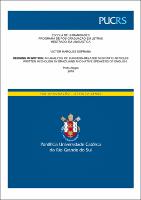| Share record |


|
Please use this identifier to cite or link to this item:
https://tede2.pucrs.br/tede2/handle/tede/7961| Document type: | Dissertação |
| Title: | Hedging in writing : an analysis of business-related scientific articles written in english by brazilians and native speakers of english |
| Author: | Soprana, Víctor Marques  |
| Advisor: | Ibaños, Ana Maria Tramunt |
| Abstract (native): | English has become crucial for success in publishing scientific articles within the globalized academic world. Although English has become a Lingua Franca and, therefore, has been used to speak among people with different mother tongues who share English as a second language, the same openness is not found within scientific articles – which have a specific structure, regardless of the nationality of the writer. In light of this multicultural process, this thesis aims to provide scientific article writers with a theoretical outline about the relevance of cross-cultural and pragmatic knowledge when writing, especially regarding the use of hedging. This thesis was developed based on the hypothesis that some pragmatic features, specifically hedging, might transfer from a writer’s first language (L1) to their second language (L2) and that such transfer would diminish their chances in successful publication of scientific articles in journals. In order to confirm this hypothesis, the following has been developed: first, a theoretical background has been presented, providing basis on pragmatic awareness, pragmatic transfer and multicultural communication. After, hedges and hedging strategies have been introduced and discussed, focusing on the differences between hedges and hedging, and the pragmatic effect that hedging causes. The following section describes the methodology and comprises the analysis of the introduction section of scientific articles produced by a native speaker (NS) and a non-native speaker (NNS), in this case a Brazilian. Both scientific articles are within the same area of knowledge, namely the business area. The aforementioned analysis and theoretical research support suggestions on how to rephrase categorical sentences found in the article written by a NNS. As a result, many instances were found where NNSs hedging is lacking, evidencing the necessity of an enhanced pragmatic awareness when a NNS writes a scientific article. |
| Abstract (english): | A língua inglesa se tornou crucial para o sucesso em publicação de artigos científicos no atual mundo acadêmico globalizado. Embora o inglês tenha se tornado uma Lingua Franca e, portanto, seja usado para falar com pessoas que possuem diferentes línguas maternas que compartilham o inglês como segunda língua, a mesma abertura não é encontrada em artigos científicos – os quais possuem uma estrutura específica, independente da nacionalidade do escritor. Considerando tal processo multicultural, esta dissertação objetiva prover a escritores de artigos científicos um referencial teórico sobre a relevância do conhecimento intercultural e pragmático durante a escrita, especialmente sobre o uso de estratégias de hedging. Esta dissertação foi desenvolvida baseada na hipótese de que algumas características pragmáticas, especificamente hedging, podem ser transferidas da primeira língua (L1) de um autor para sua segunda língua (L2) e que tal transferência poderia diminuir a possibilidade de publicação de artigos científicos em revistas acadêmicas. Para confirmar tal hipótese, foi desenvolvido: inicialmente, um referencial teórico foi apresentado, provendo bases teóricas sobre consciência pragmática, transferência pragmática e comunicação multicultural. Após, hedges e estratégias de hedging foram introduzidas e discutidas, focando nas diferenças entre hedges e hedging, e o efeito pragmático causado pelo uso de hedging. A seção seguinte descreve a metodologia e análise da seção de introdução de artigos científicos produzidos por um falante nativo (NS) e um falante não-nativo (NNS), neste caso um brasileiro. Ambos artigos científicos encontram-se dentro da mesma área de conhecimento, a área de negócios. A análise previamente mencionada e o referencial teórico baseiam sugestões sobre como reescrever frases categóricas encontradas no artigo escrito por um NNS. Como resultado, muitas ocorrências de falta de hedging por NNS foram encontradas, evidenciando a necessidade de uma maior consciência pragmática quando um autor NNS escreve artigos científicos |
| Keywords: | Pragmatics Hedging Pragmatic Transfer Scientific Article Analysis Pragmática Transferência Pragmática Análise de Artigo Científico |
| CNPQ Knowledge Areas: | LINGUISTICA, LETRAS E ARTES::LETRAS |
| Language: | eng |
| Country: | Brasil |
| Publisher: | Pontifícia Universidade Católica do Rio Grande do Sul |
| Institution Acronym: | PUCRS |
| Department: | Escola de Humanidades |
| Program: | Programa de Pós-Graduação em Letras |
| Access type: | Acesso Aberto |
| Fulltext access restriction: | Trabalho não apresenta restrição para publicação |
| URI: | http://tede2.pucrs.br/tede2/handle/tede/7961 |
| Issue Date: | 19-Jan-2018 |
| Appears in Collections: | Programa de Pós-Graduação em Letras |
Files in This Item:
| File | Description | Size | Format | |
|---|---|---|---|---|
| Dissertação - Victor Marques Soprana.pdf | VICTOR_MARQUES_SOPRANA_DIS | 934.18 kB | Adobe PDF |  Download/Open Preview |
Items in DSpace are protected by copyright, with all rights reserved, unless otherwise indicated.




